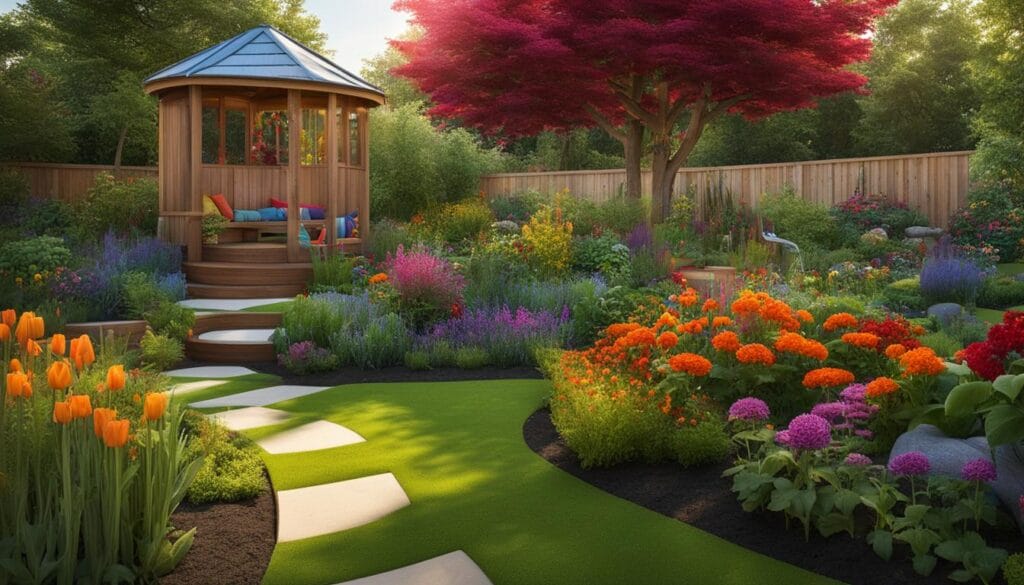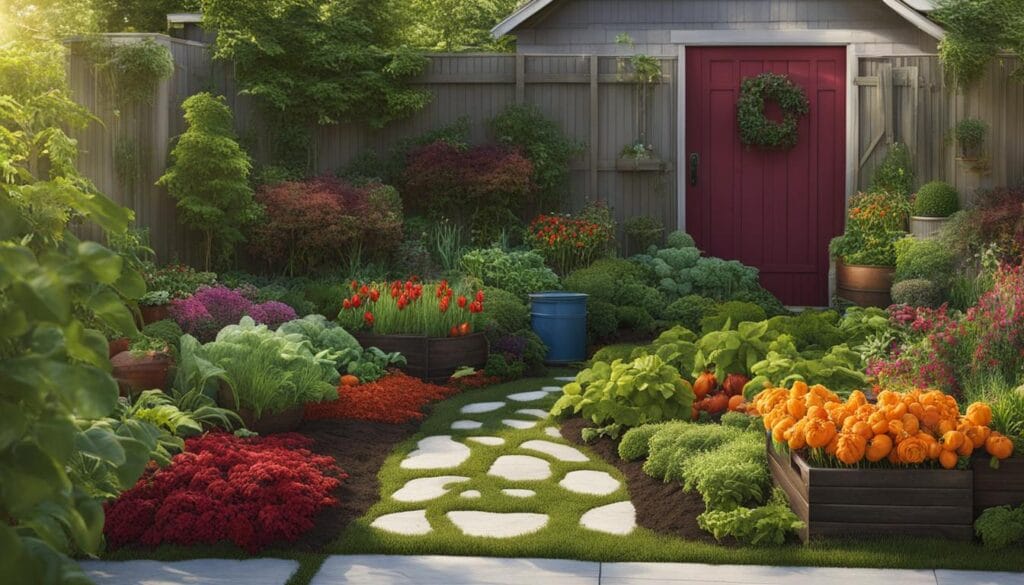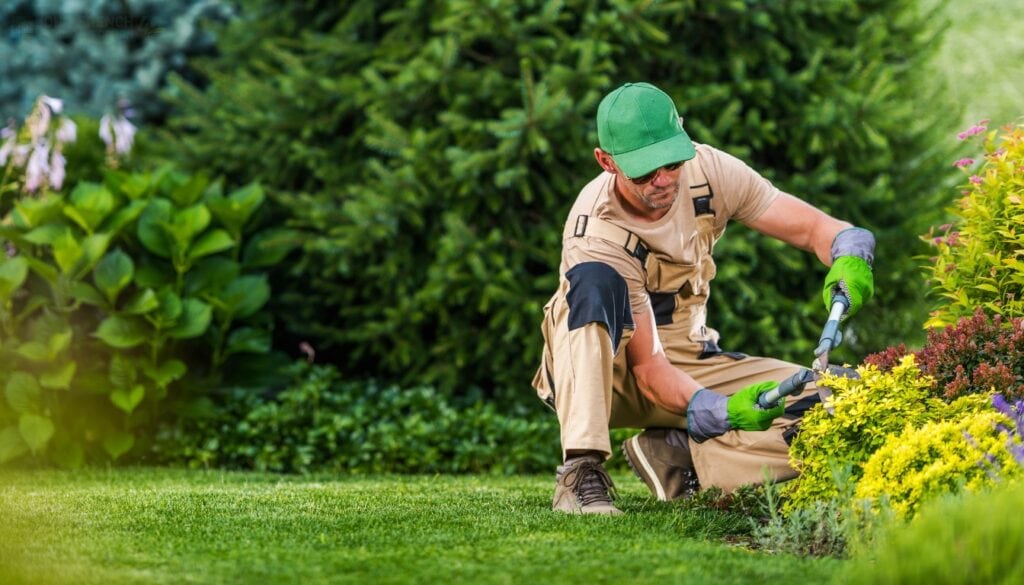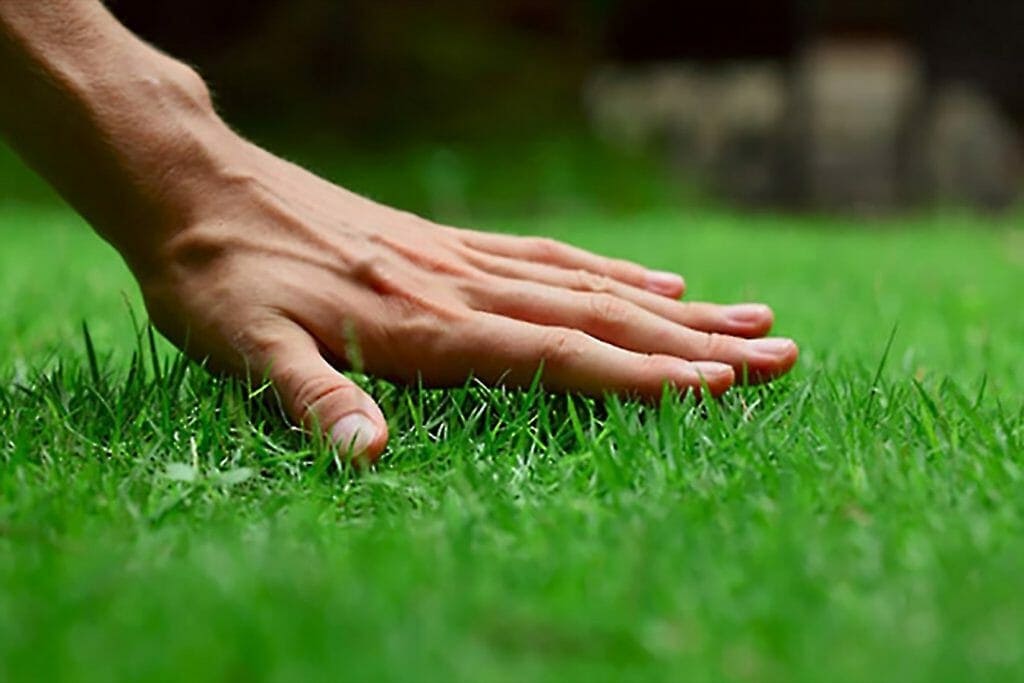Welcome to our comprehensive guide on mastering sustainable gardening practices for your Buckinghamshire garden. In this article, we will explore the best practices to help you achieve a lush and sustainable garden in Buckinghamshire. By embracing eco-friendly nurseries, practicing organic gardening, and incorporating child-friendly elements, you can create an environmentally responsible and thriving garden.
Key Takeaways:
- Implement soil conservation techniques to prevent erosion and maintain soil health.
- Choose native plants for your garden to promote biodiversity and reduce water consumption.
- Practice organic gardening by avoiding synthetic chemicals and using compost to enrich the soil naturally.
- Conserve water through rainwater harvesting and consider sustainable irrigation techniques.
- Create a child-friendly garden by selecting non-toxic plants and ensuring safety measures.
Choosing Eco-Friendly Buckinghamshire Nurseries
When it comes to sourcing plants for your Buckinghamshire garden, it’s crucial to choose nurseries that prioritize eco-friendly practices. By selecting the right nurseries, you not only support sustainable gardening but also contribute to the preservation of local biodiversity. Look for nurseries in Buckinghamshire that offer a diverse range of native plants. These plants are well-adapted to the local climate and require minimal watering and pesticide use.
Native plants are an excellent choice for your garden as they provide habitat and food sources for local wildlife, while also requiring less maintenance. They have evolved to thrive in the Buckinghamshire region, making them hardy and resilient. By incorporating native plants into your garden, you can create a beautiful and sustainable landscape that supports the local ecosystem.
To further support eco-friendly gardening practices, consider embracing organic gardening techniques. Organic gardening eliminates the use of synthetic chemicals, pesticides, and fertilizers. Instead, it relies on natural methods to promote plant health and soil fertility. By choosing organic gardening methods, you ensure the safety of your garden and contribute to a healthier environment for all.
Quote: “Selecting native plants from eco-friendly nurseries is not only beneficial for your garden but also for the overall conservation of Buckinghamshire’s natural resources.” – [Your Name]
By choosing eco-friendly nurseries in Buckinghamshire and incorporating native plants into your garden, you can create a sustainable and vibrant outdoor space. Whether you’re an experienced gardener or just starting, embracing eco-friendly practices will benefit both your garden and the environment for years to come.
| Benefits of Choosing Eco-Friendly Nurseries | How to Identify Eco-Friendly Nurseries |
|---|---|
|
|
Sustainable Garden Design at Nurseries Aylesbury
Nurseries Aylesbury offer a wealth of opportunities for creating a sustainable garden that is both beautiful and eco-friendly. By incorporating certain practices into your garden design, you can contribute to water conservation efforts and promote a healthier environment.
Composting for Soil Enrichment
One effective method of promoting sustainable gardening is through composting. By composting kitchen scraps, yard waste, and other organic materials, you can create nutrient-rich compost that will naturally enrich your soil. This helps to improve soil structure, retain moisture, and support the growth and health of your plants. Additionally, composting reduces the amount of waste that goes to landfills, making it an environmentally responsible practice.
Rainwater Harvesting for Water Conservation
Water conservation is another important aspect of sustainable garden design. With Aylesbury’s unpredictable weather, capturing and utilizing rainwater can help reduce our reliance on mains water and contribute to water conservation efforts. Installing a rainwater harvesting system allows you to collect rainwater from your roof and store it for later use in watering your plants. This not only saves water but also helps to prevent soil erosion and reduces the strain on local water resources.
| Benefits of Rainwater Harvesting | How to Implement Rainwater Harvesting |
|---|---|
|
|
By implementing sustainable garden design practices at Nurseries Aylesbury, you can create a garden that not only enhances the beauty of your outdoor space but also contributes to a greener and more sustainable future. Remember to choose nurseries that prioritize eco-friendly practices and offer a diverse selection of native plants suitable for the local climate. With composting and rainwater harvesting, you can enrich your soil and conserve water, making a positive impact on the environment and promoting a healthy garden ecosystem.
Creating a Child-Friendly Garden with Kids Kingdom Daycare
If you have children or plan to have them visit your garden, integrating Kids Kingdom Daycare elements can enhance their experience and ensure their safety. Creating a child-friendly garden involves careful plant selection, implementing safety measures, and providing a space for exploration and play.
Child-Friendly Plants
When choosing plants for your child-friendly garden, it’s important to consider their safety. Opt for non-toxic plants that are labeled as safe for little ones. Some examples of child-friendly plants include sunflowers, marigolds, pansies, and snapdragons. These colorful and engaging plants will not only add beauty to your garden but also provide a safe environment for children to explore.
Safety Measures
Ensuring the safety of children in your garden is crucial. Here are some safety measures to consider:
- Create secure play areas: Install fences or barriers to keep children away from potential hazards such as ponds or flower beds.
- Use natural barriers: Plant hedges or shrubs to create natural barriers that prevent children from wandering into restricted areas.
- Soft surfaces under play equipment: If you have play equipment like swings or slides, consider installing a soft surface such as rubber mulch or sand to cushion falls and reduce the risk of injuries.
Quotes
“A child-friendly garden is not only a place for play but also a space for learning and exploration. By incorporating Kids Kingdom Daycare elements, you can create an environment that fosters curiosity, creativity, and a love for nature.” – Garden Expert
By following these tips and incorporating Kids Kingdom Daycare elements into your garden design, you can create a safe and enjoyable space for children to connect with nature and experience the wonders of gardening.

Understanding Sustainable Irrigation Techniques
In order to maintain a healthy and thriving garden, it is crucial to implement sustainable irrigation techniques. By optimizing your water usage and minimizing waste, you can promote water conservation and contribute to a more eco-friendly gardening practice. In this section, we will explore the key strategies for sustainable irrigation, including rainwater harvesting and water recycling.
1. Rainwater Harvesting
Rainwater harvesting is a simple and effective way to collect and utilize rainwater for your garden’s irrigation needs. Installing a rainwater harvesting system allows you to capture rainwater from roofs or other surfaces and store it for future use. This not only reduces your reliance on mains water but also helps prevent water runoff and erosion. To implement rainwater harvesting, you will need a collection system, such as rain barrels or tanks, as well as a distribution system to deliver the water to your garden.
2. Water Recycling
Water recycling, also known as water reclamation, is another sustainable irrigation technique that can significantly reduce water waste. This involves treating and reusing wastewater for irrigation purposes. By implementing a water recycling system, you can reduce your reliance on freshwater sources and contribute to a more sustainable water management system. There are different methods of water recycling, including greywater systems that treat and reuse water from sources like sinks, showers, and washing machines.
| Benefits of Sustainable Irrigation Techniques | Benefits of Rainwater Harvesting | Benefits of Water Recycling |
|---|---|---|
| Conserves water resources | Reduces reliance on mains water | Decreases freshwater consumption |
| Minimizes water waste and runoff | Prevents erosion and flooding | Reduces the strain on freshwater sources |
| Promotes sustainable water management | Cost-effective and low-maintenance | Conserves energy used for water treatment |
Incorporating sustainable irrigation techniques into your gardening routine not only helps conserve water but also promotes a more eco-friendly lifestyle. By implementing rainwater harvesting and water recycling, you can reduce your environmental impact and contribute to a greener future.
By understanding and implementing sustainable irrigation techniques like rainwater harvesting and water recycling, you can minimize water waste in your garden and contribute to a more environmentally conscious approach to gardening. These practices not only conserve water resources but also help prevent runoff and erosion, promoting healthier and more sustainable gardens. Embrace these techniques to create a thriving garden while minimizing your environmental impact.

Organic Gardening for Healthy and Eco-Friendly Harvests
Organic gardening is a sustainable and environmentally friendly approach that focuses on natural methods and avoids the use of synthetic chemicals. By adopting organic gardening practices, you can promote soil health, enhance biodiversity, and contribute to a healthier ecosystem.
One of the key principles of organic gardening is composting. Composting allows you to recycle kitchen scraps and yard waste, turning them into nutrient-rich soil amendments. By adding compost to your garden beds, you can improve soil structure, retain moisture, and provide essential nutrients to your plants.
In addition to composting, organic gardening emphasizes natural pest control methods. Instead of relying on chemical pesticides, you can implement techniques such as companion planting, which involves growing certain plants together to deter pests. You can also attract beneficial insects like ladybugs and praying mantises, which prey on garden pests naturally. By incorporating these strategies, you can minimize the use of harmful chemicals while maintaining a pest-free garden.
Organic gardening is not only beneficial for your garden but also for your health and the environment. By choosing organic gardening practices, you can grow healthy and nutritious crops without the harmful effects of synthetic chemicals. So, why not give organic gardening a try and enjoy the satisfaction of growing your own food while preserving the planet for future generations?
Conclusion
Congratulations on taking the first step towards creating an eco-friendly garden! By incorporating sustainable gardening practices, you can make a positive impact on the environment while enjoying the beauty and rewards of a thriving garden.
Building an eco-friendly garden starts with choosing native plants. These plants are adapted to the local climate, requiring less water and pesticides. They also promote biodiversity and attract beneficial insects, creating a healthy garden ecosystem.
Water conservation is another crucial aspect of sustainable gardening. Implementing rainwater harvesting systems allows you to collect and utilize rainwater for irrigation, reducing your reliance on mains water. This not only saves water but also promotes sustainability.
Lastly, practicing organic gardening is a key component of sustainability. By avoiding synthetic chemicals and incorporating composting, you can improve soil health naturally and reduce the need for pesticides. Embrace sustainable gardening practices, choose native plants, conserve water, and create an eco-friendly garden that benefits both you and the environment.
FAQ
What are some eco-friendly Buckinghamshire nurseries to source plants from?
Look for nurseries in the Buckinghamshire area that prioritize sustainable practices and offer a diverse range of native plants adapted to the local climate. These plants require less watering and pesticides, making them more environmentally friendly.
How can I incorporate composting into my gardening routine?
Composting is an excellent way to naturally enrich the soil in your garden. You can start by collecting vegetable scraps, coffee grounds, and yard waste in a compost bin. Mix them regularly to speed up the decomposition process, and soon you’ll have nutrient-rich compost to use in your garden.
What are some child-friendly plants that are safe for little explorers?
When creating a child-friendly garden, choose plants that are non-toxic and labeled as safe for children. Some examples of child-friendly plants include sunflowers, marigolds, and lavender. These plants add beauty to your garden while ensuring the safety of young visitors.
How can I conserve water in my garden?
There are several ways to conserve water in your garden. Consider installing a rainwater harvesting system to collect and use rainwater for irrigation. You can also explore water recycling or reclamation methods to treat and reuse wastewater for your garden. These practices help reduce the environmental impact of water use and promote sustainable water management.
What is organic gardening, and how can I practice it?
Organic gardening focuses on natural methods and avoids synthetic chemicals. To practice organic gardening, you can start by using compost to enrich the soil naturally. Implement natural pest control techniques, such as companion planting and attracting beneficial insects, to minimize the use of pesticides. This promotes soil health and biodiversity in your garden.
How can I create an environmentally responsible garden?
To create an environmentally responsible garden, you can incorporate eco-friendly practices such as choosing native plants, conserving water through rainwater harvesting, and practicing organic gardening. These practices minimize the use of resources and contribute to a greener and more sustainable future.
Source Links
- https://www.linkedin.com/pulse/sustainable-eco-friendly-irrigation-nurturing-earth-responsibly-p-a-nkzgf
- https://medium.com/@v1technologiesposting/mastering-sustainable-gardening-practices-for-your-buckinghamshire-garden-e0963ccae2bc
- https://medium.com/@shabinaanjum1976/organic-gardening-2f2e1c5ce971



